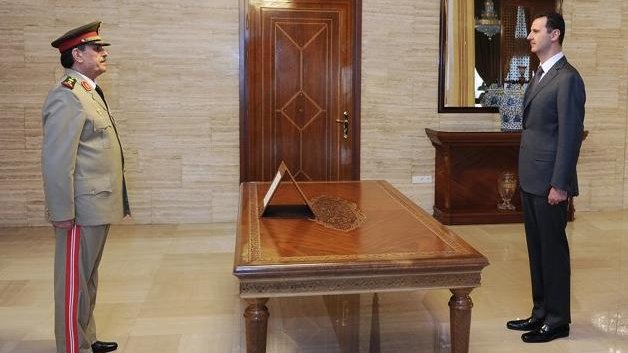In this handout photo released by the Syria's government news agency SANA, Assad swears in his new defense minister Fahd Jassem al-Freij.
DAMASCUS, Syria, July 19 (UPI) -- The Obama administration was taking steps to head off further bloodshed and chaos as rebels were reported to have gained control of border crossings in Syria.
The New York Times reported Thursday rebels had taken over all four crossings into Iraq and one into Turkey, and the Los Angeles Times said officials from the United States and its allies are reaching out to opposition leaders in an effort to provide for a peaceful transition of power if President Bashar Assad is overthrown.
U.S. officials also urged Israeli leaders not to resort to military force to try to take control of chemical weapons in Syria, the Los Angeles Times reported.
Assad appeared on state television Thursday, one day after three members of his inner circle were assassinated in a suicide bombing. He swore in a new defense minister and the images from the presidential palace were played on a continuous loop by the Syrian Arab News Agency, The New York Times reported.
SANA's English-language Web site, however, was inaccessible for much of Thursday.
Arab media reported Assad and his family have fled by plane to his hometown near the seaport of Latakia. Kuwaiti newspaper al-Rai said Assad fled to the village of Kardaha in the Alawite Mountains following the deaths of his three top security chiefs Wednesday. From there he is directing his regime's response, the paper said.
The London based Arab-language newspaper al-Quds al-Arabi said there were reports Assad survived an assassination attempt Tuesday evening and may be suffering from injuries to his legs and abdomen.
Israel Radio broadcast a message from an unidentified rebel commander saying battles were ongoing at the entrance to Assad's fortified presidential palace in Damascus and Syrian air force helicopters were firing missiles at the fighters.
The New York Times said Thursday residents were fleeing Damascus as fighting in the capital city entered its fifth day, with the Syrian military issuing a statement saying Wednesday's bombing increased their determination to "clear the homeland of the armed terrorist groups."
China and Russia Thursday vetoed a U.N. Security Council resolution that would have threatened increased sanctions on Syria due to the escalating violence.
A Syrian human rights organization said at least 15 people were killed in gun battles in the village of Jebata al-Khashab some 2 kilometers (1.2 miles) from Israel's border Thursday. A statement released by the organization said clashes "have been taking place since the morning between Assad's army and a group of deserters in the village near the occupied Golan Heights," Israel National News said.
The regime said Wednesday's bombing attack inside the headquarters of Syria's national security council, a compound near Assad's fortified palace, was the work of a suicide bomber. The Free Syrian Army said it was a remotely detonated explosive.
The FSA told the British newspaper The Daily Telegraph two bombs -- one made of 25 pounds of TNT and the other a smaller Composition C-4 plastic explosive -- were planted in the conference room days before the meeting by an opposition mole working for Gen. Hisham Ikhtiyar, one of Assad's intelligence chiefs.
"One was hidden in a packet of chocolates and one in a big flower pot that was in the middle of the table of the conference room," FSA logistical coordinator Louay al-Mokdad told the newspaper.
He said the operation was conducted by FSA members in collaboration with drivers and bodyguards working for Assad's inner circle -- a scenario repeated by other activists.
The dead included Defense Minister Daoud Rajiha, former Defense Minister Hassan Turkmani, who headed the regime's crisis management cell, and Asef Shawkat, Assad's brother-in-law and deputy chief of staff of the Syrian military.
Shawkat was widely believed to be the most significant victim. He was the husband of Assad's older sister, Bushra, and was one of the most feared figures in Assad's inner circle.















